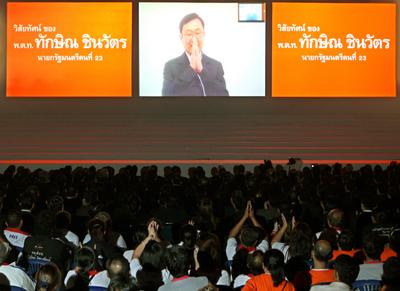It commonly said that the Pheu Thai Party, led in absentia by the exiled former Prime Minister Thaksin Shinawatra, is ‘populist’ while the current government, led by Abhisit Vejjajiva of the Democrat Party, is more representative of the Thai establishment. It is also said that the competition between them has increasingly pushed the Democrats themselves towards more ‘populist’ policies.
But what is ‘populism’, and does it really describe Thaksin’s Pheu Thai Party? Popular definitions characterise it as an ideology of sociopolitical thought that emphasizes the difference between ‘the people’ and ‘the elite’, often to buttress an authoritarian regime. The Cambridge dictionary defines it in opposition to ‘statism’, which holds that a small group of professional politicians know better than the people and should therefore make decisions on their behalf. In their book Populism in Asia, Kosuke and Pongpaichit note that populist rhetoric is typically complemented by ‘anti-intellectualism, anti-elitism, and often anti-foreign sentiments’. UCLA economist Sebastian Edwards (in his Left Behind: Latin America and the False Promise of Populism) describes economic populism as an emphasis on public expenditures that win political support through short-term redistributions towards targeted groups as opposed to public investments that raise long-term productivity.
Do these descriptions really apply to Pheu Thai and its leader Thaksin Shinawatra? Thaksin’s recent announcement of his party’s economic policies for the election indicate that they do. Speaking by video transmission to party members on 23 April, Thaksin outlined an admirably detailed set of economic initiatives, and some broader policy goals. There were two components: capital intensive mega-projects and redistributive initiatives designed to attract new sources of political support. The common thread across these announcements was a focus on policies that involve highly visible capital injections or heavy handed rhetorical approaches to problems.
The important point is what the policy does not contain: anything about reforming Thailand’s antiquated systems of primary and secondary education, the single greatest impediment to long-term economic progress in the country; anything about reforming the country’s regressive tax system that favours the rich over the poor; or anything about raising the productivity of Thailand’s masses of unskilled and semi-skilled workers.
Thaksin’s proposed mega-projects include:
– a 30 – 60 km wall to protect Bangkok from flooding;
– a water diversion project to bring water to 25 Thai river basins, diverted from Burma, Laos and Cambodia;
– a high-speed train linking Bangkok with major cities;
– a ‘land bridge’ (not a canal) linking the Gulf of Thailand with the
Andaman Sea; and
– 10 new electric train lines in Bangkok.
There is every possibility that at least some of these mega-projects will make economic sense, once they are properly evaluated. But Thaksin is not interested in waiting around for that to be done.
The redistributive initiatives include:
– a 3 to 5 year debt moratorium for people owing 500,000 to 1 million baht;
– a 10 million baht minimum revenue guarantee for local administrative organisations;
– a farmers’ credit card project, presumably backed by the government;
– a 15,000 baht per month minimum salary guarantee for bachelor’s degree graduates;
– a 1 billion baht education fund for state and private universities;
– a tax-cut for first-home buyers;
– a tax-cut for first-car buyers;
– free wi-fi in public areas;
– a guaranteed price of 15,000 baht per tonne for unmilled rice; and
– an increase in the minimum wage to 300 baht per day.
Many of these initiatives are reminiscent of Thaksin’s policies during his period in office of 2001 to 2006. He has directly recycled two broader promises from the 2001 election, in which he won an unprecedented parliamentary majority:
– elminate the drugs problem within 12 months; and
– eliminate poverty within four years.
Following the 2001 election ‘eliminate the drugs problem’ proved to mean giving the police permission to kill anyone suspected of being a drugs dealer. The police themselves are widely said to be the most important drug dealers, so the policy was interpreted by many as a licence for the police to remove their competition. More than 2,000 extra-judicial murders occurred, none were properly investigated and no one was ever charged. Although the policy was indeed popular with Thaksin’s supporters, the drug problem was not eliminated.
Similarly, Thaksin did not succeed in eliminating poverty during his earlier period in office. Indeed the annual rate at which poverty declined was lower than the historical average over the preceding three decades. In my view, there was one simple reason. Thaksin’s redistributive expenditures were implemented at the expense of productive investments, especially in agriculture, the economic base of a high proportion of Thailand’s poor.
In a recent paper, a Thai colleague and I demonstrated that during Thaksin’s period of government expenditure on agricultural research and extension declined as a proportion of agricultural output by 77 and 60 per cent, respectively. Numerous studies, including our own, demonstrate that agricultural research is a powerful driver of productivity growth in agriculture and hence a driver of sustained poverty reduction. Redistributions toward the poor can reduce poverty, but their once-only effect lasts only as long as the redistributions continue. There is no sustained effect on the productivity of the recipients.
Thaksin’s policies include some innovative ideas, and this can hardly be said of the Democrats. But Thaksin’s brand of populism threatens to take Thailand down the South American dead-end route described so well by Sebastian Edwards.
Peter Warr is Head of the Arndt-Corden Department of Economics, and John Crawford Professor of Agricultural Economics at the Crawford School of Economics and Government, at the Australian National University.

